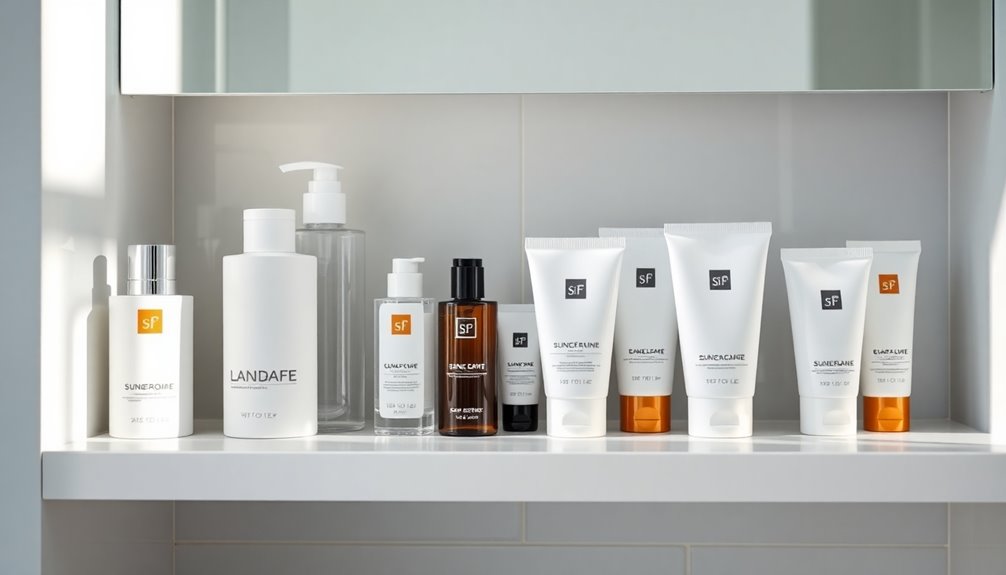To prevent wrinkles and maintain youthful skin, experts recommend using SPF 30 or higher sunscreens with antioxidants and hyaluronic acid. Opt for chemical sunscreens as they effectively protect against aging signs. Choose sunscreens that cater to your skin type, offering anti-aging benefits. Mineral sunscreens physically block UV rays, ideal for sensitive skin, while chemical ones absorb UV rays with lighter textures. Consider SPF 50 or higher for better protection against skin damage. Make sure to select broad-spectrum sunscreens for overall skin health. Expert recommendations on sunscreen application can help preserve your youthful appearance and skin health.
Dermatologist Recommended Sunscreens
Looking for the best sunscreens to prevent wrinkles? Dermatologists recommend sunscreens with at least SPF 30 and broad-spectrum protection to shield against UVA and UVB rays, key factors in anti-aging.
Opt for sunscreens containing antioxidants, hyaluronic acid, and niacinamide, as these ingredients help prevent wrinkles and promote youthful skin. Choose mineral sunscreens with non-comedogenic formulations for daily use to maintain a healthy complexion without clogging pores.
By consistently using dermatologist-recommended sunscreens, you can minimize fine lines, wrinkles, and premature aging. Prioritize sunscreens that offer anti-aging benefits alongside sun protection to keep your skin looking radiant and youthful.
Best Drugstore Facial Sunscreen
To continue your pursuit of effective sun protection that aids in averting wrinkles, consider incorporating the Aveeno Protect and Hydrate into your skincare regimen. This dermatologist-recommended drugstore sunscreen offers wide-spectrum SPF protection at a budget-friendly price point, making it a convenient option for daily sun defense.
Crafted with nourishing components like oat extract, it's gentle on delicate skin and provides enduring moisture without a greasy sensation. The non-comedogenic formulation guarantees that it won't block pores, rendering it appropriate for all skin varieties.
With its airy consistency, Aveeno Protect and Hydrate is ideal for daily application to thwart wrinkles and sun harm. Make Aveeno Protect and Hydrate your preferred facial sunscreen for a nourishing and defensive barrier against detrimental UV rays.
Chemical vs. Mineral Sunscreens
Considering the choice between chemical and mineral sunscreens can significantly impact your skin's protection against harmful UV rays. Chemical sunscreens absorb UV rays, while mineral sunscreens use zinc oxide and titanium dioxide to physically block them. Mineral sunscreens are ideal for sensitive skin, less likely to cause irritation or allergic reactions. However, they may leave a white cast on the skin.
On the other hand, chemical sunscreens are cosmetically elegant with lighter textures, but some individuals might experience skin irritation. Mineral sunscreens are also considered reef-safe, protecting marine life from harmful chemicals that can be found in some chemical sunscreens. Both types offer UV protection when used correctly, so choosing between them often comes down to personal preference and skin sensitivity.
Whether you prioritize sensitive skin care, environmental impact, or texture, selecting the right sunscreen is crucial for maintaining healthy and youthful skin.
Sunscreen for Sensitive Skin
For individuals with sensitive skin, finding the right sunscreen is key to protecting your skin from the sun's harmful rays without causing irritation. Look for sunscreens that are hypoallergenic and moisturizing to prevent any potential skin reactions.
Consider options like Walgreens brand SPF 50 Hydrating spray or Walgreens brand SPF 50 Premium Moisturizing spray with vitamin E for gentle protection. The SPF 50 Clear Complexion Sunscreen is formulated to be suitable for sensitive skin types, providing the necessary sun protection without triggering any sensitivity.
Opt for sunscreens specifically designed to be gentle on sensitive skin, ensuring that you shield your skin from the sun's damaging effects without compromising its health. By choosing a sunscreen that caters to sensitive skin and provides the necessary SPF 50 protection, you can enjoy your time outdoors with peace of mind knowing your skin is well cared for.
Top SPF Levels for Sunscreens
Wondering which SPF level is best to defend your skin against wrinkles and premature aging caused by the sun's harmful rays? Dermatologists recommend using SPF 30 or higher to prevent signs of aging. For better protection against UV rays and reduced risk of skin damage and wrinkles, opt for SPF 50.
Sunscreens with SPF 30 to 50 are effective in preventing sun-induced wrinkles and fine lines. Choosing a higher SPF provides increased protection against UVB rays, which contribute to skin aging. By selecting a sunscreen with SPF 50 or above, you can help minimize the formation of wrinkles and maintain youthful skin.
To shield your skin from the harsh effects of the sun, especially in the quest for wrinkle-free and youthful-looking skin, opting for SPF 50 or higher is a wise choice. Protect your skin, prevent wrinkles, and maintain a youthful appearance with the right SPF level in your sunscreen.
Sunscreen Application Tips
To secure effective protection against the sun's harmful rays and prevent premature aging, proper application of sunscreen is essential. Apply sunscreen generously at least 15 minutes before heading out in the sun to make sure it has enough time to absorb into your skin. Remember to reapply sunscreen every 2 hours, or right after swimming or sweating, to maintain its protective benefits.
Opt for a broad-spectrum sunscreen with SPF 30 or higher to shield your skin from both UVA and UVB rays. Don't overlook areas like your ears, neck, hands, and lips when applying sunscreen.
For your face, consider using a separate sunscreen with anti-aging ingredients such as antioxidants or peptides for added protection and benefits. By following these simple sunscreen application tips, you can help protect your skin and combat signs of aging effectively.
Sunscreens for Different Skin Types
When it comes to selecting the right sunscreen, considering your skin type is key to guaranteeing ideal protection and skin health.
For oily skin types, opt for oil-free, non-comedogenic sunscreens with a matte finish to prevent excess shine.
Dry skin benefits from hydrating sunscreens containing ingredients like hyaluronic acid or glycerin.
Acne-prone skin requires non-comedogenic formulas with acne-fighting components such as salicylic acid.
If you have sensitive skin, choose fragrance-free, hypoallergenic sunscreens with soothing ingredients like aloe vera or chamomile.
Melanated skin can benefit from mineral sunscreens with no white cast and added antioxidants like vitamin C to prevent hyperpigmentation.
Regardless of your skin type, make sure your sunscreen offers at least SPF 30 and provides protection against both UVA and UVB rays to prevent wrinkles and maintain skin health.
Sunscreen Comparison and Features
Searching for the ideal sunscreen to prevent wrinkles? When comparing sunscreens for their anti-aging benefits and SPF protection, consider key features like lightweight formulas and broad-spectrum protection.
EltaMD UV Clear stands out with its SPF 46 shield and niacinamide for anti-aging benefits.
If you prefer a weightless, invisible finish, Supergoop Unseen Sunscreen offers SPF 40 protection.
Aveeno Protect and Hydrate combines SPF 50 with hydrating oat extracts to prevent wrinkles.
Coola Classic Face Sunscreen boasts SPF 50 protection and antioxidant-rich ingredients for anti-aging benefits.
These sunscreens excel in high SPF levels, anti-aging ingredients, and lightweight formulas, making them ideal for preventing wrinkles.
Next, let's explore the best sunscreens for rosacea to guarantee your skin remains protected and radiant.
Best Sunscreens for Rosacea
Considering your sensitive skin's needs, selecting sunscreens for rosacea requires careful attention to specific characteristics. To effectively protect your rosacea-prone skin, opt for mineral-based sunscreens containing zinc oxide or titanium dioxide. These ingredients provide gentle yet powerful protection against harmful UV rays without causing irritation.
Look for SPF 30 or higher to guarantee adequate sun protection while being mindful of triggering rosacea symptoms. Additionally, choose sunscreens with soothing ingredients like niacinamide, aloe vera, or green tea extract to calm redness and inflammation.
Prioritize lightweight and non-greasy formulas that are dermatologist-tested and non-comedogenic to prevent clogging pores and potential flare-ups. By selecting a sunscreen that meets these criteria, you can shield your skin from the sun's damaging effects while minimizing the risk of exacerbating your rosacea.
Expert Insights on Sunscreen
To enhance your understanding of sunscreens, it's valuable to gain insights from experts in the field. Dermatologists recommend using broad-spectrum sunscreens with SPF 30 or higher to protect your skin from UV damage and prevent premature aging and wrinkles.
Regular application of sunscreen, especially on your face, is essential in maintaining skin elasticity and warding off fine lines. Look for facial sunscreens containing antioxidants and hyaluronic acid, as these ingredients can further support skin health and combat signs of aging.
Consistent use of sunscreen is pivotal to preventing wrinkles and preserving a youthful appearance. When choosing a sunscreen, opt for a chemical sunscreen that suits your skin type and provides adequate protection against harmful UV rays. Following expert recommendations for sunscreen application can help you safeguard your skin and maintain a youthful, wrinkle-free complexion.
Conclusion
To sum up, safeguarding your skin from the sun is essential in preventing wrinkles and other signs of aging. By using a sunscreen suggested by dermatologists and customized to your skin type, you can guarantee that you are offering the optimal protection. Remember to reapply consistently and opt for a sunscreen with a high SPF level to maintain your skin looking youthful and healthy. Expert insights and recommendations can assist you in choosing the most suitable sunscreen for your requirements.


